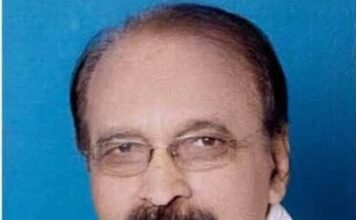Helping Indian diaspora trace their roots
Weather and airline join hands to trouble Hajis
Hajj is the most important travel in a Muslim’s lifetime, and for most of us it is once-in-a-lifetime travel. Some wait for years to save money and be free from obligations so that they can carry out this religious obligation with spiritual sprit and peace. It, therefore, comes as a surprise to hear of incidents wherein Hajis and their relatives get into arguments, heated exchange and even physical violence.
Hadiths provide guidance too
After Bhutto
Yet one more Beijing duck! Manmohan visit to China
UN seeks $261 million to help 4 million displaced Iraqis
$1.5 trillion in foreign investment for 2007
Bush visits the good and bad guys in the Middle East
Remembering uncle – the man behind Jaipur Foot
Let’s not export saffron mischief to Malaysia!
Malaysia has been of the very few countries with which India can be said to be enjoying consistently friendly relationship. Bilateral trade volumes, currently at USD 4.5 billion, are growing. The relation has been marked by full respect to for each other and been mutually beneficial. There has been no talk of one of them taking advantage of the other.
After counterproductive Indian ‘concern’, Malaysian Tamils get deserted, left sulking
On top of all the harm his mercenary outfit had inflicted upon India-Malaysia relations and its disservice to Indian Diaspora, HINDRAF chief Waytha Moorthy has got philosophical. He said, “We tried our level best; but if we don't succeed, we have to call it a day, isn't it? . . . because not all battles are meant to be won!”
Karbala: The true symbol of non-violent resistance
Post-Benazir, Pakistan faces multiple challenges
How ISI engineers Pakistan elections
The art of philanthropy and the Indian diaspora
Pervez Musharraf is destroying Pakistan
Benazir, politics and India’s oil economy
NRIs in Kenya: shaken but safe
Let Kashmiris decide their destiny: Safvi
The West takes notice as Russia and Iran get closer
Why is the Congress stumbling?
A cold spell soon to replace global warming
Indian judiciary: a time for introspection
Madrasa teaching reforms essential : Tariq Rasheed Firangi Mahali
U.S. and Russia: 200 years of diplomatic relations
Benazir offered to pour me tea, asked about my children
Pakistan Peoples Party: the Bhutto family heirloom
What triggered Benazir’s assassination?
Nepal’s Terai calls for mature leadership
US Stalks Gulf of Mexico Oil Wealth
Death of Benazir Bhutto ‘Martyr of Democracy’
The death of former Pakistani Prime Minister Benazir Bhutto is being mourned by millions of Pakistanis. She had a profound public base despite staying out of her country for nearly a decade and dogged by corruption and nepotism charges.
Hope for Pakistan

Much has been written about Benazir Bhutto, her death is a severe blow to democracy in Pakistan.
She threatened the extremists, a dare move perhaps calculated to win the support of majority of moderates in Pakistan who want to live a normal life. They got to her before she could get them.
Year of the fake sting exposed media’s fault lines
Narendra Modi: dubious politics, good economics
Bhutto death augurs unrest, lawlessness in N-armed nation
Gujarat elections and aftermath
Benazir’s Assassination: A Tragedy Foretold
Benazir: intrepid woman, charismatic politician
Thus spake Benazir…
A case for marriage registration
Benazir’s assassination has dangerous portents
Benazir: the girl who mesmerised Shimla
 In July 1972, Shimla, the summer capital of the British Raj and a tourist paradise after Independence, had few tourists. The reason was that the Himalayan resort had top officials of India and Pakistan arriving in droves to prepare for a summit meeting between then prime minister Indira Gandhi and Zulfikar Ali Bhutto, the then prime minister of Pakistan.
In July 1972, Shimla, the summer capital of the British Raj and a tourist paradise after Independence, had few tourists. The reason was that the Himalayan resort had top officials of India and Pakistan arriving in droves to prepare for a summit meeting between then prime minister Indira Gandhi and Zulfikar Ali Bhutto, the then prime minister of Pakistan.
Of green colour and salt politics in Kashmir
Waving a green handkerchief, showing a piece of rock salt - both symbolic references to Pakistan - and questioning Jammu and Kashmir's accession to India, sometimes even openly. These have become potent tools for leaders, who otherwise claim to be secular, to exploit the religious leanings of gullible Kashmiris.
The politicians misuse these means in a Muslim-dominated society in exactly the same way that Hindu fanatics exploit the Ram temple issue to sway voters in the rest of India.
Inquilab 1857 to Sachar Report -Indian Muslims continue to struggle
Sri Lanka’s militarism keeping tourists and investments away
Modi victory: chauvinism, economic growth mix is unbeatable
Talents that sparkled on big screen in 2007
Will Modi’s win in Gujarat threaten India as a democratic and secular nation?
Trend toward fewer conflicts seems to be reversing
Modi’s success: can he emerge as national leader?
Will the Congress pick up Rane’s gauntlet?
New coach and fresh ideas spur Indian hockey
Life changes in 25 minutes during HIV test
Talking about honour killings
Americans glimpse the “real” Iran
Be the moderate you’re looking for
Spare the school bully, blame the system
Cautioning NRI workers and spouses with TV ads
Multi-religious democracy and its challenges
Western pattern of democracy was evolved in mono-religious societies. Almost all European countries had mainly Christianity as the sole religion with sprinkling of Jews living in ghettoes having no franchise. Thus there were no challenges of living in multi-religious society. In India too, multi-religious society was not a problem for centuries and Indian society never saw any inter-religious tensions, let alone violence.
If Modi wins in Gujarat…
No person seems to have dominated Gujarat politics as much as Chief Minister Narendra Modi over the last one decade. In case he wins this 2007 election, where fifty-fifty chances appear after the voting on 11 and 16 December, what will be the ‘Modis’ effect on national politics viz-a-viz BJP and if he fails, how the Congress and BJP will turnaround their politicking in India; a debate every political analyst and media portal is genuinely trying to explore.
Musharraf lifts emergency: more cosmetic than substantive
Colombia budgeting on Indian software
India awaits early elections
The unspoken truth in Iran’s nuclear report
Strong rupee a plus point for India
The BJP turns to GenPast: but will Advani deliver?
That the Bharatiya Janata Party (BJP) would make the perennial No. 2 of GenPast its new No. 1 should cause no surprise. After all, for as long as one can remember, Atal Bihari Vajpayee and L.K. Advani were the 'twin towers' (as a hawkish scribe derisively described them) of first the Jan Sangh and then the BJP. So, if one withdraws from the fray, the other has to step in almost automatically.
Is it the beginning of the end for Modi?
Muslims in Indian economy: interview with Dr. Omar Khalidi
Nandigram: attempt to destabilise an elected govt through Maoist violence
Hindutva is the greatest threat for Dalits: Rajesh Solanki
Magnetic power more than form gets Sehwag in team for Australia
In the shadow of Zion
From Madrid to Annapolis – peace conferences are not enough
Pakistan tests nuclear-capable cruise missile
Shame! Insult business of Taslima ‘Bharati’
Move over, Umajee and Mamatajee! We've discovered the true Draupadi who can successfully force a Mahabharat-style war to avenge the insult of defeat five centuries ago at the hands of Zahir ud-Din alias Babar. The 'refugee' is only too willing to be pawn in the great political gamble of Bharat!
Muslim commerce is ages old
Situation of Dalits in Gujarat is very depressing: Valjibhai Patel
Women and understanding of Quran
We need to stop thinking about religion and identity alone: Hanif Lakdawala
NRI passengers look for way out of the fog
Anti-Muslim pogrom planning had begun months before Godhra: Fr. Cedric Prakash
Novel experiments in madrasa reform
The travails of the Indian diaspora in Malaysia
Big retail’s time has come in India
Traditionalist ulema lead educational revolution in Kerala
Next Pravasi Bharatiya Divas will be a much improved one
Pakistan’s third transition: Will it succeed?
Position of marginalized in Gujarat is steadily worsening: Afzal Memon
Afroz Jahan: A woman of strength
 I read about her in a small article in the ‘Times of India’ and decide to visit her during my recent trip to Lucknow. I met her at her home in Choudhary Tola - a nondescript locality of Aliganj. . Afroz Jahan does not come across as some fire brand activist or a high society socialite working for the cause of down trodden. This mild mannered frail woman comes from a conservative Muslim family of a daily wage earner.
I read about her in a small article in the ‘Times of India’ and decide to visit her during my recent trip to Lucknow. I met her at her home in Choudhary Tola - a nondescript locality of Aliganj. . Afroz Jahan does not come across as some fire brand activist or a high society socialite working for the cause of down trodden. This mild mannered frail woman comes from a conservative Muslim family of a daily wage earner.
Secularism and its problems in India
Forest rights – and why the new law needs to be implemented
Hindutva forces are bound to become more aggressive: Mukul Sinha
No to appeasement politics
Price of oil approaching $100 per barrel
Wanted: a long-term energy policy for India
‘Black Tongue’ gives a taste of Bengal
Madrasa reforms and the Deobandi ulema’s response
Asylum for Taslima Nasrin
Maharaja of the skies upsets NRIs on ground
US moves to contain resurgent Taliban, Al Qaeda in Pakistan
Communal harmony must be stressed by Hindu religious leaders as well: Ahmad Shaikh
Better management, global help restrict Bangla cyclone toll
The death toll in Hurricane Sidr that slammed Bangladesh's southern coast has remained at four digits, around 3,300, defying the initial alarm, thanks to improved disaster management by the authorities and a fast response from the world community.
Can journalism keep pace with India’s mushrooming media?
India is on an extraordinary media proliferation spree. Delhi just got its 14th morning daily in English, the tabloid Mail Today. New TV channels have been surfacing at the rate of two a month, and eight more are in the queue to make their debut in the next few months, we are told.
Taslima: hounded in her house of words
Bangladeshi writer Taslima Nasreen has willy-nilly turned into an itinerant minstrel, hounded by commissars and fanatics alike, intoning her outcast song of angst against the lies of religion and the state. Kolkata, the famously liberal cosmopolitan city hospitable to the muse and its patrons, looked on as the apparatchiks decided to send the beleaguered writer to Rajasthan after violent protests by Muslim fundamentalists.
Nandigram: People should be in, terror should be out
Muslim quota & Hindu fear of national disintegration
Nandigram to Nasreen: the scene gets murkier
There was yet another twist to the Nandigram affair when a Muslim organisation engaged in running battles with Kolkata police over demands relating to the recent events in Nandigram also called for the expulsion of Taslima Nasreen from India.
This was the first time that the 'attack' by cadres of the Communist Party of India-Marxist (CPI-M) on opposition strongholds in Nandigram was mixed up with the stay of the controversial Bangladeshi writer in India.
State logic is not simple logic
Board keen to license sports management firms to avoid conflicts
An incident that changed the history of Achalpur
Pakistan’s nuclear-armed army faces its sternest test yet
Too many similarities between Nandigram and Gujarat
Maulana Abul Kalam warned against India befriending Israel
In 1948 Pandit Jawaharlal Nehru called a conference of Asian countries in which 15 Asian countries participated. The conference emphasized the value of unity and friendship between Asian countries, opposition to war, colonialism and world peace. In this conference Maulana Azad openly favoured helping Palestinian cause and opposed friendship of India with Israel as well as advocated establishment of friendly relations with other countries.
India’s Myanmar policy and the Mizoram connection
India's evolving political approach to events in Myanmar (Burma) is moving fairly rapidly: it now appears in conformity with a large section of international opinion, advocating internal dialogue, national reconciliation and accommodation as led by the United Nations in its effort through Ibrahim Gambari, the special envoy of the UN secretary general.
Dawn of new era in Aligarh Muslim University
Communalism is essentially a political phenomenon: Prasad Chacko
Religion and society- a note on dialectical relationship
Arc of instability in Pakistan raises scary scenario
Regional parties are the bane of Indian politics
Straddling the world of words in India
Godhra fire was not a pre-planned conspiracy: Shubhradeep Chakravorty
CBI’s impartiality has taken a beating
Often seen as dancing to the tunes of the central government in politically sensitive cases, the Central Bureau of Investigation's (CBI) impartiality has taken a fresh beating following its divergent stands before the Supreme Court in cases involving three politicians.












